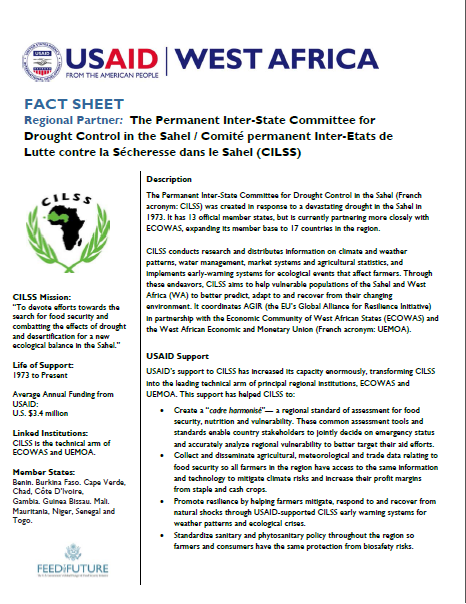CILSS Mission:
“To devote efforts towards the search for food security and combatting the effects of drought and desertification for a new ecological balance in the Sahel.”
Life of Support:
1973 to Present
Average Annual Funding from USAID:
U.S. $3.4 million
Linked Institutions:
CILSS is the technical arm of ECOWAS and UEMOA.
Member States:
Benin, Burkina Faso, Cape Verde, Chad, Côte D'Ivoire, Gambia, Guinea Bissau, Mali, Mauritania, Niger, Senegal and Togo.
Description
The Permanent Inter-State Committee for Drought Control in the Sahel (French acronym: CILSS) was created in response to a devastating drought in the Sahel in 1973. It has 13 official member states, but is currently partnering more closely with ECOWAS, expanding its member base to 17 countries in the region.
CILSS conducts research and distributes information on climate and weather patterns, water management, market systems and agricultural statistics, and implements early-warning systems for ecological events that affect farmers. Through these endeavors, CILSS aims to help vulnerable populations of the Sahel and West Africa (WA) to better predict, adapt to and recover from their changing environment. It coordinates AGIR (the EU’s Global Alliance for Resilience Initiative) in partnership with the Economic Community of West African States (ECOWAS) and the West African Economic and Monetary Union (French acronym: UEMOA).
USAID Support
USAID’s support to CILSS has increased its capacity enormously, transforming CILSS into the leading technical arm of principal regional institutions, ECOWAS and UEMOA. This support has helped CILSS to:
• Create a “cadre harmonisé”— a regional standard of assessment for food security, nutrition and vulnerability. These common assessment tools and standards enable country stakeholders to jointly decide on emergency status and accurately analyze regional vulnerability to better target their aid efforts.
• Collect and disseminate agricultural, meteorological and trade data relating to food security so all farmers in the region have access to the same information and technology to mitigate climate risks and increase their profit margins from staple and cash crops.
• Promote resilience by helping farmers mitigate, respond to and recover from natural shocks through USAID-supported CILSS early warning systems for weather patterns and ecological crises.
• Standardize sanitary and phytosanitary policy throughout the region so farmers and consumers have the same protection from biosafety risks.
• Monitor changing land use patterns and the impact of land degradation, desertification and human use on the environment through the CILSS/U.S. Geological Survey West Africa Land Use and Land Cover Trends Project. By documenting the changing landscape using satellite images and local knowledge, CILSS provides decision makers with information needed for managing their natural resources.
• Assist countries to initiate and train a national team for biosecurity analysis.
• Dispense tools and strategies for the integration of nutrition into public policy in six of the 13 member states.
CILSS Accomplishments
• Created a cadre harmonisé that determines five stages of vulnerability. It uses 12 different indicators for the analysis: availability of food, accessibility of food, malnutrition, water supply, etc.
• Created AGRHYMET, a regional system for collecting and disseminating information on agriculture, hydrology and meteorology, and for training staff from member states on these areas.
• Regularly disseminates information to farmers by radio, using weather and climate information systems to advise farmers on how to best time their planting and whether or not to use short-season varieties of seeds in order to maximize production.
• Improved early warning systems for farmers so they can better prepare for, deal with, and recover from ecological crises like drought or flood.
• Initiated of a data collection system for regional trade.
CILSS and the Presidential Feed the Future Initiative
One of the key pillars of the West Africa Feed the Future strategy is promoting climate-smart agriculture. Especially in this region, climates are rapidly changing and becoming more unpredictable, so it is crucial to help farmers mitigate increased risk. CILSS has historically been at the forefront of both climate research and the extension of this research to small farmers. This precedence has established CILSS as the regional leader in resilience. With support from USAID, CILSS has steadily built its capacity so that it will function powerfully and efficiently in the long term.








Comment
Make a general inquiry or suggest an improvement.